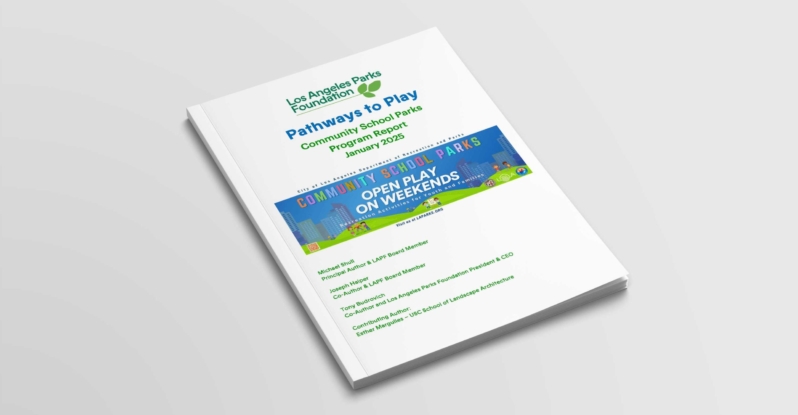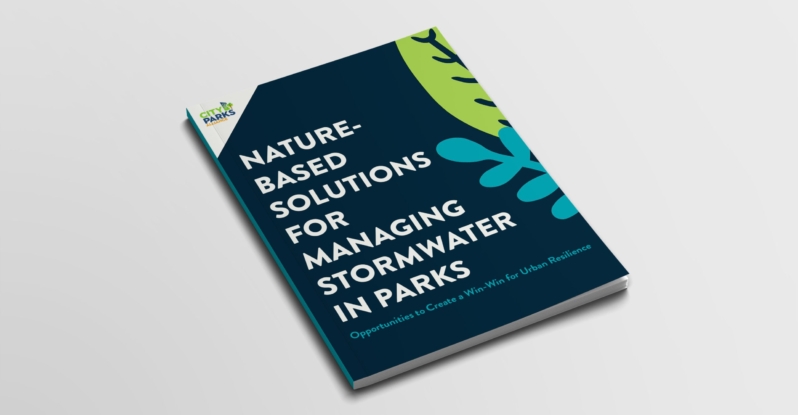Summary
In 2017, Philadelphia’s City Council passed Rebuilding Community Infrastructure (Rebuild), an endeavor set forth by Mayor Jim Kenney that aims to invest hundreds of millions of dollars to revitalize neighborhood parks, recreation centers, playgrounds, and libraries across the city. The bulk of Rebuild’s financing will arrive via bonds which are made possible by revenue from the Philadelphia Beverage Tax, a tax on the distribution of sweetened beverages. Rebuild sites are prioritized based on the physical condition of sites and how they align with Rebuild’s values of promoting equity and encouraging economic growth. During the planning process, poverty, crime and health data are used to provide each site with a score.

Philadelphia, PA, July 2019: Mayor Kenney joined Council President Darrell Clarke and Parks & Recreation to celebrate the opening of a brand new $1.4 million playground and outdoor play space at Fishtown Recreation Center. The project was funded by Rebuild, Council President Clarke, Trust for Public Land, and DCNR.
Overview
In 2017, Philadelphia’s City Council passed Rebuilding Community Infrastructure (Rebuild), an endeavor set forth by Mayor Jim Kenney that aims to invest hundreds of millions of dollars to revitalize neighborhood parks, recreation centers, playgrounds, and libraries across the city. The bulk of Rebuild’s financing will arrive via bonds which are made possible by revenue from the Philadelphia Beverage Tax, a tax on the distribution of sweetened beverages. The Kenney administration originally estimated $300 million in bonds, but the ultimate amount will depend on how much the city can afford to borrow based on beverage tax revenues and market conditions. Rebuild’s budget is also supported by $48 million from the city capital budget and support from foundations – most notably a commitment of up to $100 million from the William Penn Foundation. Even if Rebuild would reach its goal of becoming a $500 million program, it would not be enough to address the significant needs of the entire system.
Understanding that every site will not be reached through Rebuild, the program has set up a site prioritization framework that focuses on promoting equity and fairness across Philadelphia. Most of Rebuild’s community investment will go to high-need neighborhoods where concentrated poverty, elevated crime rates, and heightened health risks (asthma, obesity, and diabetes) are impacting the lives of local residents. Much of this city’s capital funding for parks is split evenly between council districts, so Rebuild presents a new opportunity to invest equitably.
Driving Force Behind the Rebuild Initiative
The driving force that allowed Rebuild to become a reality was a combination of factors including the mayor making it a top priority as well support from city staff, local stakeholders, and foundations. Mayor Jim Kenney proposed the initiative when he came into office. The beverage tax was in his budget address. Rebuild was led first by the park and recreation commissioner and then by Mike DiBerardinis, the city’s managing director. The significant deferred maintenance problem across the city, with only 10% of parks/rec centers/libraries in excellent condition, spurred a strong advocacy constituency effort. And lastly, there was significant local foundation support. In turn the city council passed the beverage tax, and the William Penn and Knight Foundations funded the planning effort. The William Penn Foundation committed up to $100 million to assist Rebuild. Now the city is raising additional funds to address remaining needs across the city.
Site Selection Criteria
Rebuild sites are prioritized based on the physical condition of sites and how they align with Rebuild’s values of promoting equity and encouraging economic growth before being proposed to City Council, which approves all sites receiving investment from Rebuild’s bonds. During the planning process, poverty, crime, and health data were used to provide each site with a score of 1-5 based on the relative level of each indicator in the community surrounding the site. Typically, a site is considered high need if one of the indictors was a 4 or 5; however, the use of data is not an exact science given that conditions in communities are constantly changing. 64 sites have been approved by city council, and two-thirds of those are in high-need neighborhoods. When possible, Rebuild will also look to invest in neighborhoods that may be growing and present opportunities to spur additional economic growth and help stabilize the community.
There are three major goals for Rebuild:
- Revitalizing community spaces
- Engaging and empowering communities
- Promoting economic opportunity
Depending on need, investment in each Rebuild site could range from $50,000 to $14 million or more. Both site selection and the level of investment will be guided by data analysis and input from city staff and council members. Projects all across Philadelphia are now active and undergoing community engagement, design, or active construction. Future sites will be identified on a periodic basis throughout the duration of the initiative. The city is partnering with non-profit organizations to carry out improvements at many of the sites.
How to Keep the Program Running
The Philadelphia Beverage Tax does not have a time limit, however Rebuild is expected to be a 5-7 year program. Once the program is over, the non-profit partners that will have carried out improvements at certain sites will continue to support the programming and maintenance of the newly renovated spaces. Success of the program will inform future policy decisions related to equitable park funding.
Understanding the Progress of the Initiative
There are many involved in understanding the progress of the program including the mayor’s office, philanthropy, and city council. Rebuild has an oversight board that includes funders, city council members, city officials, and other subject matter experts from outside the city.
Conditions Specific to the City that Make the Initiative Possible
Philadelphia has one of the highest poverty rates of any major American city. The political will of the mayor and the funding community’s participation was essential to making Rebuild happen. The planning effort can be time-consuming and costly for a city. The William Penn Foundation’scommitment of up to $100 million and the Knight Foundation’s initial $1.5 million – both of which funded the planning process and early implementation of the program – was vital.
Key Ingredients to Making Equitable Park Funding a Success
Prior to Rebuild, the city, with the help of the William Penn Foundation, had success developing and renovating public space projects. These successful investments laid the groundwork for Rebuild by showing the success of the projects and partnerships.
Rebuild is a great model for public private partnership. During the planning phase, there were partnerships between the city, foundations, and non-profits. The non-profits are managing the process of making improvements to the site and are expected to continue to play a role at the site after a project is completed; however, they are not expected to take over management of the site. The newly created or renovated parks will continue to be public, city-operated facilities.
Obstacles to Implementing Equitable Park Funding
It is always challenging to pull off a new large program in government since there are many stakeholders involved, not only with the city staff but with outside contributors. Implementation is complex and time-consuming.
Can this model be replicated?
Rebuild can be replicated if other cities had the factors listed above in place. Additionally, different components of the program can be replicated in isolation and at varying scales (e.g., prioritization of sites to invest in, creating a new revenue stream for funding, partnerships with nonprofits, partnerships with foundations, etc.).
To reference this material, please cite Equitable Parks: Case Studies + Recommendations, City Parks Alliance, 2020.
Equitable Park Funding Research & Strategies
This case study is one of seven, compiled as part of City Parks Alliance’s national initiative to research, curate, and disseminate innovative strategies and models for funding parks and green infrastructure in low-income communities.



